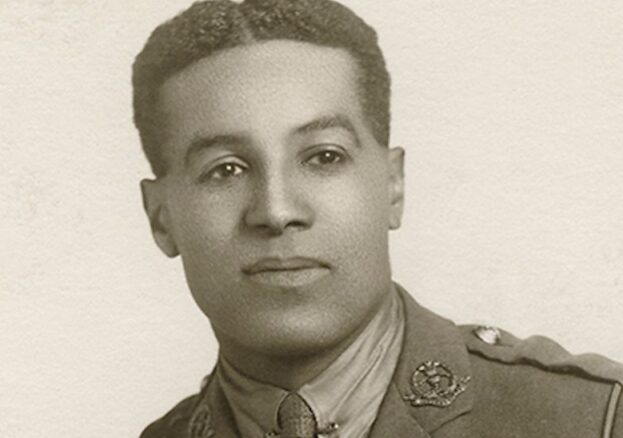
Walter Tull’s story is one of remarkable courage, resilience, and groundbreaking achievements in the face of daunting societal challenges. Born on 28 April 1888 in Folkestone, Kent, Tull’s life journey, though tragically brief, continues to resonate as a beacon of inspiration, embodying the strength of character and commitment to breaking down barriers.
Early Life: Overcoming Adversity
Walter Tull’s early years were marked by heartache and loss. His mother, Alice Palmer, died of breast cancer when he was just seven, and his father, Daniel Tull, a carpenter from Barbados, passed away two years later. Orphaned, Walter and his brother Edward were sent to a Methodist orphanage in Bethnal Green, London. These formative years were a crucible of hardship that forged Tull’s resilience and determination. Despite the societal limitations imposed on orphans and people of colour at the time, Tull’s childhood experiences laid the foundation for his later achievements.
A Trailblazer in Football
Tull’s entry into professional football was a groundbreaking moment in the history of the sport. He began his football career at Clapton FC, where he quickly made a name for himself, helping the team win several amateur trophies. His talent did not go unnoticed, and he soon joined Tottenham Hotspur, one of the most prestigious clubs in England.
At Tottenham, Tull faced significant racial prejudice. Despite this, he consistently displayed exemplary conduct and professionalism, earning respect on and off the field. His ability to rise above adversity set a new precedent in football, challenging the prevailing racial prejudices of the time.
Tull’s transfer to Northampton Town in 1911 marked another significant phase of his football career. Under the management of Herbert Chapman, Tull flourished, becoming a central figure in the team. His time at Northampton Town was marked by impressive performances, further cementing his legacy as a pioneer in British football.
The Great War: Heroism Beyond the Pitch
The outbreak of the First World War in 1914 brought a new chapter in Tull’s life. He enlisted in the British Army, joining the 17th (1st Football) Battalion of the Middlesex Regiment, a unit that included many professional footballers. Tull’s military career was as groundbreaking as his football career. He was quickly promoted to the rank of sergeant and served on the Somme in France.
In May 1917, Tull made history by becoming the first black officer in the British Army to lead white British soldiers in battle. His commission was a direct challenge to the military regulations of the time, which restricted the rank of officer to those of ‘pure European descent’. Tull’s leadership and valour were exemplary. He served with distinction on the Italian front, where he was mentioned in dispatches for his “gallantry and coolness” under fire.
The Ultimate Sacrifice and Legacy
Walter Tull’s life was tragically cut short on 25 March 1918, during the Spring Offensive near the village of Faveuil in France. He was just a month shy of his 30th birthday. His body was never recovered, and he is commemorated on the Arras Memorial in France. Tull’s death was not just a loss to his family and friends but to the many who admired him for his courage and integrity.
Tull’s story is a powerful symbol of the struggle for racial equality in Britain. His achievements in both football and the military challenged the entrenched racial prejudices of early 20th-century Britain and paved the way for future generations. His life and death remind us of the countless individuals who, like him, fought for dignity and equality through their service and sacrifice.
Honouring Walter Tull
Today, Walter Tull is celebrated as a pioneer who transcended the racial and social limitations of his era. His story has become an integral part of Britain’s educational curriculum, teaching future generations about equality, perseverance, and the strength of the human spirit.
In Northampton, a memorial to Tull stands proudly outside the Guildhall, and a road has been named in his honour. At Sixfields Stadium, home of Northampton Town FC, a statue commemorates his contributions to football and his heroism in war.
Conclusion: A Timeless Inspiration
Walter Tull’s story, spanning the football fields of England to the battlefields of France, is a poignant reminder of the power of resilience, dignity, and purpose. His life’s journey, from overcoming early adversity to breaking down racial barriers, continues to inspire more than a century later.
As we remember Walter Tull, we celebrate not just a man who shattered barriers but also one who left an indelible mark on British history. His legacy stands as a testament to the strength of the human spirit and serves as a beacon of hope for a more inclusive and equitable world.
